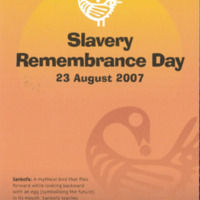
Slavery Remembrance Day in Liverpool
Slavery Remembrance Day, as designated by UNESCO, took place in Liverpool on 23 August 2007. The day was commemorated with a series of events, marked first by a multi-faith act of worship at Liverpool's Parish Church of St Nicholas. A traditional African libation ceremony, calling on ancestors to bless the event, took place on the city's waterfront at Otterspool Promenade. A programme of music and drama showcased Black culture and heritage around the themes of life in Africa, the Middle Passage and the legacies of transatlantic slavery. The International Slavery Museum at the Albert Dock had its official opening on the same day. The symbol of the day was the Sankofa, a mythical African bird that files forward while looking backward.
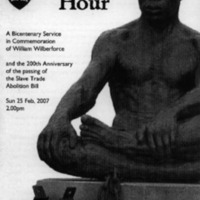
The Better Hour: A Bicentenary Service in Commemoration of William Wilberforce
A bicentenary service in commemoration of William Wilberforce and the passing of the 200th anniversary of the Abolition Act took place in February 2007 at York Minster. The service featured Pocklington School Choir, Transglobal Drummers and the Riding Lights Theatre Company (performing extracts of the play African Snow). Organisations associated with the service included Churches Together in England and the Set All Free project, and the Wilberforce Institute for the study of Slavery and Emancipation at the University of Hull
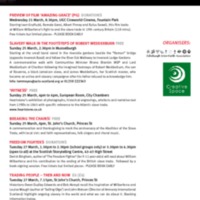
Marking the 200th anniversary of the Abolition of the Slave Trade
A programme of events to mark the bicentenary was organised by Edinburgh Inter-Faith Association. This included a slavery walk in the footsteps of Robert Wedderburn, a commemoration and thanksgiving service at St John's Church in Edinburgh, and a debate and discussion on the theme 'Trading People - Then and Now'.
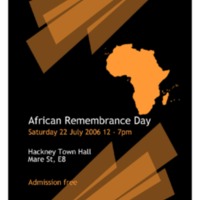
The Ligali organisation, 2007
Ligali is a Pan-African human rights organisation that challenges the misrepresentation of African people, culture and history in the British media. It produced various responses to promote the African perspective of the 2007 bicentenary, including their 'Declaration of Protest to the 2007 Commemoration' expressing dissatisfaction with much of the terminology and focus of the 'official' commemorations. Their particular focus was on the ‘Maafa’, derived from the Kiswahili word meaning ‘great disaster’, and referring to the ongoing impact of enslavement and colonialism for African peoples. The publication ‘Addressing Maafa denial and slavery apologists’ was a guide to promoting the truth about the Maafa from an Africentric position.
‘Maafa: Truth 2007’ is a documentary film directed by the Ligali founder, Toyin Agbetu, and produced by Ligali’s then head of media affairs, emma pierre. The film confronts some of the myths about British slavery, featuring contributions from community activists, project workers, teachers and the African British business community. The film was screened at various events, including African Remembrance Day at Hackney Town Hall in 2006. Ligali’s ‘Freedom Fighter’ stamps were designed by Emma Pierre-Joseph as a response to the Royal Mail’s publication of six stamps to mark the bicentenary. ‘The Walk’ is a documentary record of Toyin Agbetu’s protests at the service at Westminster Abbey to mark the bicentenary on 27 March 2007.
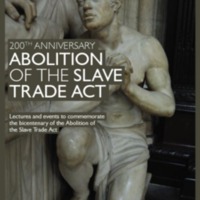
Service to Mark the Bicentenary of the Abolition of the Slave Trade Act
Westminster Abbey organised a series of lectures and events to commemorate the bicentenary. These included the lectures 'Olaudah Equiano, Black Abolitionist' by Professor Vincent Carretta, and 'The Abbey and the Abolition of the Slave Trade' by The Reverend Nicholas Sagovsky, Canon of Westminster. There was also an opportunity for visitors to attend William Wilberforce's memorial. On 27 March 2007 a national service of commemoration was held at the Abbey, and broadcast live on BBC One and BBC Radio Four. The service was attended by HM The Queen, the Prime Minister Tony Blair, other dignitaries and members of community and human rights organisations. Proceedings were disrupted by Toyin Agbetu of the Pan African, human rights based organisation Ligali. He objected to the celebratory tone of the service and its primary focus on William Wilberforce, highlighting the role of African freedom fighters and the absence of an official apology by the monarchy, government and church for Britain's leading role in transatlantic slavery, or Maafa (the Kiswahili term meaning ‘Disaster’, which is used to refer to the exploitation of Africa and its people by Europeans).
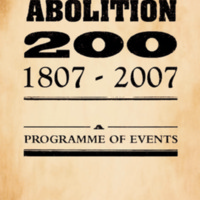
Abolition 200
A programme of events from Wolverhampton City Council to mark the bicentenary, which included a public debate about whether the British government should apologise for the slave trade, services of remembrance and film screenings. Other highlights included stories from Wolverhampton City Archives about the city's role in sustaining the slave trade, and abolishing it, and a discussion and writing workshop with the black writer Fred D'Aguiar and members of Wolverhampton's Black Readers and Writers group. 'Our Ancestors, Our Heritage, Our Stories' was a showcase event highlighting the work of the African Caribbean Community Panel.
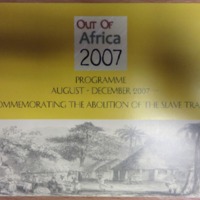
Out of Africa 2007
The African and African Caribbean Kultural Heritage Initiative (ACKHI) is a not-for-profit Black Afrikan-led community organisation, with the aim is to promote, protect and preserve the history, heritage and culture, of peoples of Black African heritage living or working in Oxfordshire. The Out of Africa programme of events in 2007 included an exhibition of books about slavery and the slave trade, which toured Oxfordshire libraries, and performances of African music and contemporary dance. The ‘Remembering Slavery’ commemorative service was held in Christ Church Cathedral. ‘Connections’ was a research project looking at Oxfordshire’s links to the system of slavery and the slave trade. ‘InTentCity’ was a visual arts project, in partnership with Fusion Arts, bringing together cultural groups, primary schools and artists to transform tents into works of art – one theme addressed was ‘Freedom’. Reflecting the legacy of the system of slavery and the slave trade, ‘Common Threads’ was an exhibition of textile work by the Textiles for Peace group, local women representing multi-cultural Oxfordshire. In ‘Ancestral Souls’, the African Women’s Art Collection (AWAC) collaborated with women of African descent to produce and exhibit 200 dolls to represent the diaspora of African peoples.
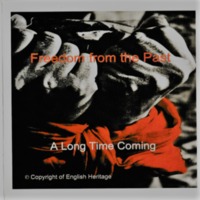
Freedom from the Past: Long Time Coming
A collaborative project between Churches Together in Northampton, English Heritage, Northamptonshire Black History Association (NBHA) and The Northampton Schools Excellence Cluster. Freedom From the Past: Long Time Coming was led by Mary Clarke, Director of the Doddridge Centre, where the NBHA office is based. The project commemorated the 1807 Act and the wider histories of black resistance and the fight against the slave trade through music, drama and historical workshops in Northampton.
The 'Passage' event was held in St Giles' Church on 25 March 2007, an evening of drama, songs and speeches reflecting on the legacies of slavery. There was a 150-strong gospel-style community choir drawn from schools in the Northampton area and local community groups. The event was one of a range of project activities in Northampton which brought together schools, community groups, churches and heritage organisations to explore the issues of slavery in the British Empire. Other events included a community event and 'Walk to Freedom' at the Northampton West Indian Community Association (NWICA) to mark 'Emancipation Day', annually held throughout the Caribbean to celebrate the abolition of slavery. English Heritage funded a professional DVD recording which was afterwards made freely available to NBHA members and others.
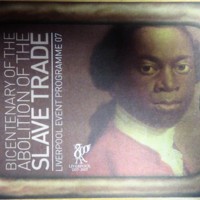
Liverpool Event Programme 07
Liverpool hosted a city-wide programme of activities and projects to commemorate the bicentenary, as part of events to mark the city's 800th birthday. The events aimed to celebrate the African Diaspora and support works by artists of African descent. They included: LEAP, an annual contemporary dance festival featuring African dance companies; a performance of Mighty Diamonds - Reggae Legends at the Philharmonic Hall; the Roscoe Lectures; the Brouhaha International Carnival, celebrating resistance, rebellion and abolition; the Africa Oyé Music Festival at Sefton Park; the Bound exhibition at Open Eye Gallery, showing works representing personal perspectives on the physical and psychological impact of slavery on humanity; and many other lectures and debates. There was also a slavery trail around the city.
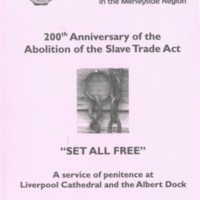
A service of penitence at Liverpool Cathedral and the Albert Dock
A multi-faith service of penitence and remembrance was held at Liverpool Cathedral on 24 March 2007 by Churches Together in the Merseyside Region. Some material in the service drew upon resources produced by Set All Free, the project of Churches Together in England. A musical welcome was offered by African drummers and the Philharmonic Gospel Choir. A procession to the waterfront at Albert Dock followed the service, where the Petals of Penitence Liturgy took place.
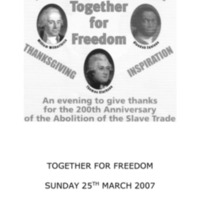
Wilberforce 2007 at Holy Trinity Church
Hull's parish church of Holy Trinity is where William Wilberforce was baptised in 1759. The Church held a number of performances and events throughout 2007. The Together for Freedom commemorative service took place on 25 March 2007, led by the Archbishop of York and featuring the Redemption Gospel Choir from Hull and Middlesbrough. The Freedom Flower Festival took place in June and the Songs of Freedom Music Festival in September, featuring performances by leading gospel performers and local schoolchildren. The London Community Gospel Choir gave a powerful concert, which highlighted the important role of music in the lives of slaves living on plantations. In August, the Freetown Society of Hull hosted a performance of the Milton Margai School for the Blind Choir from Freetown, Sierra Leone. A Panos photographic exhibition at the Church, Slave Britain, revealed the realities of contemporary human trafficking.
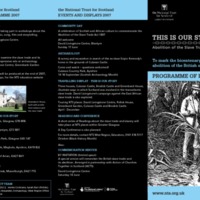
This is Our Story
To mark the bicentenary, the National Trust for Scotland put together a wide-ranging programme of events to engage their audiences with Scottish connections to slavery and abolition. Three National Trust for Scotland properties in the West of Scotland – Culzean Castle, Brodrick Castle and Greenbank House – illustrate the ways in which Scotland was involved in the transatlantic slave trade. A touring exhibition based on this new research was shown at these sites and others in the West of Scotland. The Beckford Collection of furniture, silver and China at Brodrick Castle, on the Isle of Arran, once belonged to William Beckford, owner of several sugar plantations in the West Indies. Scipio Kennedy from ‘Guinea’ lived at Culzean Castle, Ayrshire, from 1710, first as a slave and then as a paid servant. The Allason brothers of Greenbank House were traders in tobacco and slaves. David Livingstone spent much of his life campaigning against the slave trade based in East Africa. His work is remembered at the David Livingstone Centre in Blantyre.
The 2007 Learning Programme involved workshops for local community groups and a resource pack for teachers and youth leaders. Events included a celebration of Scottish and African culture at the David Livingstone Centre; a survey and excavation in search of the ex-slave Scipio Kennedy’s home in the grounds of Culzean Castle; and a Commemoration Service arranged in partnership with Action of Churches Together in Scotland (ACTS).
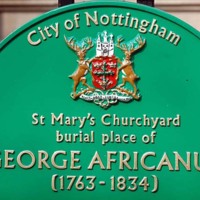
Rededication service for George Africanus
George John Scipio Africanus (1763-1834) was Nottingham's first recorded black entrepreneur, starting an employment agency called the 'Africanus Register of Servants'. As a child, Africanus was brought to England from Sierra Leone and given as a present to wealthy Wolverhampton businessman Benjamin Molineux. He then moved to Nottingham and became a freeholder. Nottinghamshire Archives and MLA East Midlands produced web resources for teachers and learners based on the life of George Africanus. An exhibition toured venues around the city, including Nottingham Council House and Brewhouse Yard. On 25 March 2007, as part of the bicentenary events in Nottingham, a service was held at St Mary's Church led by the Bishop of Kingston (Jamaica), the Rt Revd Robert Thompson. A new memorial stone was dedicated to Africanus, and a plaque unveiled commemorating his life.
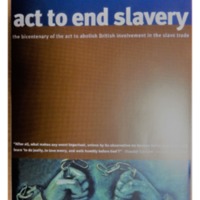
Set All Free Gloucestershire
The Gloucestershire Set All Free initiative was organised by Churches Together in Gloucester and other organisations to mark the bicentenary. An Events Guide set out some of the events, lectures, film screenings, music festivals and exhibitions taking place in Gloucestershire to remember the horrors of transatlantic slavery, while also making clear the imperative to take action to end modern forms of slavery. There were bicentenary related activities at Gloucester City Museum and Art Gallery and Cheltenham Art Gallery and Museum. There were also a number of events at Gloucester Cathedral and local churches, including St Mary's in Wotton-under-Edge. Two exhibitions focused on contemporary slavery were organised by the Anti-Slavery International League. The Guide also includes details of various festivals with a focus on the bicentenary, including the 1 World Festival Freedom 07, the Gloucester International Rhythm and Blues Festival and Cheltenham Music and Literature Festivals.
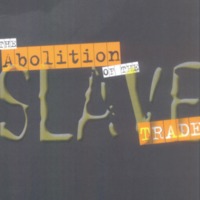
The Abolition of the Slave Trade
Kirklees Council ran a range of events in 2007, focused on local connections with slavery and abolition. Kirklees Civic Sunday was the official commemoration at Huddersfield Parish Church, with a performance by a local gospel choir and a presentation by actors as historical characters. The links between Yorkshire and the Caribbean were also explored: 8,500 people of African-Caribbean descent live in the borough of Kirklees. Events such as the Jamaica National Independence Cultural Festival, Deighton Carnival and Huddersfield Carnival celebrated African and Caribbean culture. Part of the Kirklees programme was to host the Equiano Project's touring exhibition at the Hudawi Centre in Huddersfield. The Centre went on to name one of its rooms after Equiano. Other events included talks from historians, including Richard Reddie and Paul Crooke, church services, choir concerts and theatre productions.
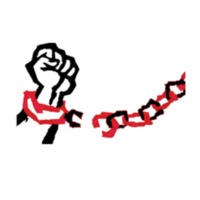
Slave Trade Abolition in Cambridgeshire & Suffolk (STACS)
The Slave Trade Abolition in Cambridgeshire & Suffolk (STACS) project was managed by St John's College at Cambridge University (the former college of the abolitionists Thomas Clarkson and William Wilberforce). Working with local schools, the project aimed to raise awareness of the often overlooked roles played by Thomas Clarkson and Olaudah Equiano within the slave trade abolition movement in East Anglia. Drama workshops led by two historical enactors led to student performances of their plays about the abolition movement. Two public presentations run by students, one in Cambridge and another at the Ipswich Caribbean Association, discussed and debated why the counties of Cambridgeshire and Suffolk should remember the life and work of Equiano and Clarkson. The final outcome of the project was the publication of new teaching resources and curriculum material to introduce students to the work of Equiano and Clarkson, and to place the transatlantic slave trade in local, national and international historical contexts. During the course of the project, BBC Radio 4 broadcast a Sunday worship service from St John's College, in association with 'Set All Free'.
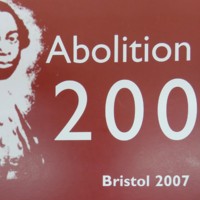
Abolition 200
Bristol was major trading port for the transatlantic slave trade in the 18th century. The city of Bristol marked the bicentenary of the Abolition Act with more than 100 events across the city - exhibitions, plays, debates, talks, concerts - under the umbrella organisation Abolition 200. In January 2007, city leaders signed a declaration of regret for the city's role in the trade. Over the weekend of 24-25 March, bells rang out across the city and a Service of Remembrance and Reconciliation was held at Bristol Cathedral, organised by a partnership of the Cathedral and the Council of Black Churches. 2007 was themed as the Year of Black Achievement, aiming to bring better provision of black heritage resources to schools in Bristol, with a particular focus on black attainment. Over 30 creative community projects were funded by Abolition 200 - including art installations, educational projects and community theatre - to reflect the themes of education, commemoration and legacy.
Featured here are some of the events from Abolition 200.
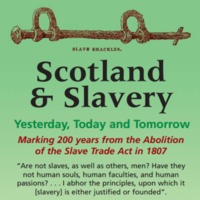
Scotland and Slavery
Action of Churches Together in Scotland (ACTS), which brings together nine Scottish denominations, marked the bicentenary with the Scottish Ecumenical Service to commemorate abolition held in the David Livingstone Centre in Blantyre in June 2007. The group also published a leaflet, ‘Slavery and Scotland’. On 25 March 2007, a commemoration walk was organised in partnership with the National Trust for Scotland. The walk started in Musselburgh and ended at the Gardens of Inveresk Lodge, once owned by James Wedderburn, who made his fortune as a slave owner in Jamaica. His son, the Jamaican-born Unitarian radical and anti-slavery advocate Robert Wedderburn, came to Musselburgh in 1795 to visit his father, but did not receive a good welcome.
ACTS also set up Freedom for All, a website project to mark the bicentenary. The website was intended to be a hub of resources and information on the impact of slavery, slave trade and abolition on Scotland.